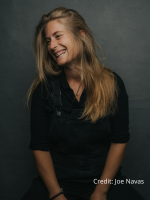Will Bonsall and I are standing in a small, dusty room that overlooks his 85-acre farm. Shelves run from floor to ceiling, and they’re filled with thousands of carefully organized and labeled packets. Bonsall is in his seventies, and he’s has been collecting and propagating seeds since he was a young farmer.
Initially, all his seeds came from seed catalogs, but that changed.
“I learned from a few old farmers in the neighborhood here, particularly a dairy farmer down the road I used to work for. He had for example an old potato, a potato called the Cow Horn Potato, a purple long narrow potato. Which was not commercially available anywhere in the world. And that was exciting. He had an old, he called it a lima bean, but it turns out it’s a white runner bean, which is like a lima bean that grows in the North, which real lima beans won’t. He had a few things like that, and that was my first awakening. Wow.”
That was forty years ago. Around the same time, Bonsall learned about an organization called the Seed Savers Exchange—a non-profit connecting people with rare or endangered food seeds. Almost immediately, Bonsall became its largest offering member.
“I learned that there were like hundreds of different kinds of cabbage. Hey! I wanna save seeds from all that cabbage. Even though I’m only gonna grow 2 or 3 for my own use maybe.”
Very quickly, getting as many varieties as possible of all kinds of different vegetables became an obsession.

“I’ve always been whacko into diversity, whacko, no matter what it is. Then I learned about the National Germplasm System. The USDA has a branch, kind of like a mega-agency for maintaining hundreds of thousands of varieties of every crop you can imagine. I mean tobacco and flowers and all the usual commodity crops and vegetable crops. And so I got a lot of that stuff, moreover, as I said before, I shared a lot of my stuff with them.”
Bonsall started connecting with farmers and gardeners all over the world. He found and saved over two hundred varieties of rutabagas. More than seven hundred kinds of potatoes. Very quickly, his seed saving project became the largest effort of its kind in the United States.
“I call it Scatterseed Project because my priority has not been simply maintaining collections in a deep freeze or something like that, but putting them into the horticultural landscape. As far as I’m concerned, the best place most sustainable secure place to preserve a variety is in a first-class envelope on its way from me to you.”
Through his Scatterseed Project, Bonsall has mailed seeds to people everywhere—grandmothers in Afghanistan and farmers just down the road. And he seeks out seed everywhere he goes.
“For example I spent a few days once in Northern Maine and New Brunswick in the Acadian settlements, along the St. John’s river collecting some local buckwheat, gooseberries, anyway, collecting whatever there was in places. I’ve done a little of that among ethnic communities like for example in Maine, there’s the Russian community down in Richmond, there is the Lebanese in some of the towns like Waterville, I’ve visited with these groups and as much as possible tried to find stuff that they had.”
The more seed varieties Bonsall collected, the more work it became to maintain what he had. The thing about seeds is that you can’t just collect them once and put them on a shelf. You have to take them out and grow them every few years to keep them alive.
“My pea collection, I have about 1200 pea varieties, and I have to grow a fourth of them out every year, about 300 pea varieties, to keep them all viable.”
Around 2013, Bonsall says his collections collapsed. He couldn’t get the funding or the labor he needed to keep growing so many thousands of seeds. He still has a lot—his potato collection for instance is down to 200 varieties—but remember it used to be 700, and for him, it’s a huge loss. He says he can get many of the seeds he had back—since he’s sent so many to other growers around the world. But he’s seventy. He doesn’t want to build up his collection again just to lose it—he wants to make it sustainable, to find a way to train young farmers and pass The Scatterseed Project on.
Bonsall holds up a picture of his great grandmother, at an agricultural fair in Waterville Maine sometime around 1910. She’s surrounded by all different varieties of potatoes, corn, and squash.
“This is my family’s heritage, which I’ve lost. The best I can do is see what I can do to collect your family’s heritage, and other people’s who haven’t lost everything and keep it going.”
Will Bonsall says extinction is a term we often hear attributed only to wild things. But it’s a reality for agriculture too. According to Bonsall, 94 percent of vegetable seed varieties were lost during the 20th century, as global agriculture became more consolidated and industrialized. He’s determined to find a way to hold on to the ones we still have.
—
You can learn more about Scatterseed Project here.
This piece first aired in April 2020.








